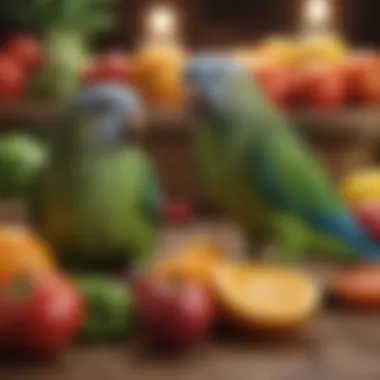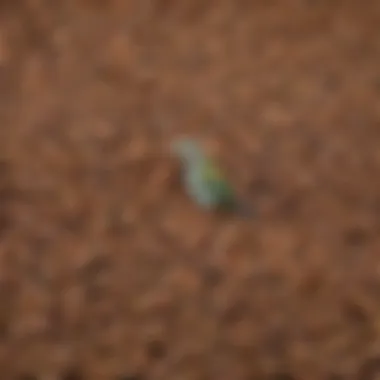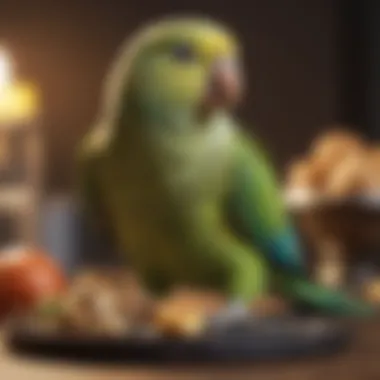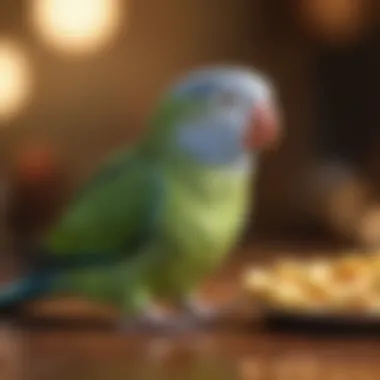The Optimal Diet for Parakeets: A Comprehensive Guide


Intro
Understanding the dietary needs of parakeets is crucial for their health and well-being. This guide will delve into optimal food options, including both commercial and natural sources. We will explore the specific nutritional requirements of these birds, covering grains, seeds, fruits, and vegetables. Moreover, we will discuss common dietary mistakes made by pet owners and provide insights on how to introduce new foods effectively. The goal is to equip you with knowledge to enhance the quality of life for your parakeets.
Understanding Your Pet
When it comes to keeping a parakeet, it's essential to understand their needs and behavior. Parakeets are social and intelligent creatures, and their environmental enrichment and diet play a significant role in their well-being.
Pet Behavior Basics
Parakeets show unique behaviors that are important for owners to recognize. They enjoy socializing, playing, and exploring. Observing their social cues can help you create a stimulating environment that promotes happiness and reduces stress.
Common Breed Characteristics
Different breeds of parakeets may have slightly different dietary needs. For example, the American Parakeet has a high metabolism and may require more seeds and greens. Understanding these characteristics can help ensure you are feeding your bird appropriately.
Species-Specific Needs
Every species of parakeet has unique dietary requirements. A general formula may not suffice. The key is to adjust their diet according to specific needs. Investigating the nutritional profiles and habits of each species can help you provide better care.
Nutrition Fundamentals
Providing proper nutrition is vital. A balanced diet ensures your parakeet remains healthy and energetic. Here’s what you need to know about their dietary components.
Grains and Seeds
Grains and seeds serve as a staple for parakeets. High-quality bird seed mixes are available in many pet stores. These mixes often contain sunflower seeds, millet, and other grains. However, moderation is key; too many seeds can lead to obesity.
Fruits and Vegetables
Fruits and vegetables are essential for their diet. Fresh produce adds vitamins and minerals. Dark leafy greens, carrots, and apples are popular options. Before introducing any new food, make sure it’s safe for your bird.
Commercial Diets
Several commercial diets are specifically formulated for parakeets. They offer balanced nutrition and convenience. Brands like Kaytee and ZuPreem create pellets that provide essential nutrients. You can supplement these diets with fresh foods.
Remember: Always research or consult a vet regarding specific dietary components suitable for your parakeet.
Common Dietary Mistakes
Many pet owners make mistakes when feeding their parakeets. Understanding these can lead to better choices in their diet.
- Focusing too much on seeds can lead to nutrient deficiency.
- Overlooking the importance of fresh foods.
- Not rotating food options, which can result in boredom.
It is advisable to continually educate yourself about parakeet nutrition.
Introducing New Foods
When adding new foods, do it gradually. This will help your parakeet adjust without distress. Start with small pieces and observe their reactions. If they refuse, try another time; patience is crucial.
Special Dietary Needs
Different ages and health conditions require tailored nutrition. Young parakeets may need more protein for growth, while older birds may need softer foods. Always consult your vet for guidance on health-specific diets.
Epilogue
Providing a balanced diet is key to ensuring the health and happiness of your parakeet. By understanding their needs and avoiding common pitfalls, you can ensure your feathered friend thrives. Dive into the next sections for more insights on care and maintenance.
Understanding Parakeet Nutrition
Understanding parakeet nutrition is crucial for ensuring the health and well-being of these vibrant birds. The right diet can significantly affect their lifespan, behavior, and overall quality of life. Parakeets, like all living creatures, require a balanced diet that includes a variety of nutrients. Failing to provide this can lead to health problems, from feather plucking to obesity and even serious organ issues.
To nurture a parakeet effectively, one must grasp the specific dietary components required. These include essential nutrients, vitamins, and minerals vital in their daily food intake. Pet owners should realize that basic birdseed is not enough. A diverse diet contributes to better health outcomes and a more lively personality in parakeets.


Essential Nutrients for Parakeets
The primary nutrients required by parakeets include carbohydrates, proteins, fats, vitamins, and minerals. Each of these plays a vital role in maintaining optimal health.
- Carbohydrates: These are the main source of energy. Seeds and grains are carbohydrate-rich, providing the energy parakeets need for daily activities.
- Proteins: Important for growth and tissue repair. Insects and legumes can add protein to their diet, creating a well-rounded nutrition plan.
- Fats: While fats should be given in moderation, they are essential for maintaining energy levels. Healthy sources include nuts and seeds.
Additionally, fruits and vegetables supply essential vitamins and minerals. Vitamin A aids in vision and immune function, while Vitamin D is crucial for calcium absorption. This shows that feeding parakeets a balanced diet not only satisfies immediate hunger but also promotes long-term health.
The Role of Vitamins and Minerals
Vitamins and minerals are often overlooked yet are key players in parakeet health. These elements assist in numerous bodily functions, ensuring optimal performance and vitality.
- Vitamin C supports the immune system, while Vitamin E serves as an antioxidant.
- Minerals like calcium are crucial for strong bone structure and reproductive health.
A deficiency in any of these components can lead to serious health issues. For instance, lack of calcium can result in skeletal deformities and egg-binding problems in females.
A balanced diet rich in vitamins and minerals is essential for the health of your parakeet. Without proper nutrition, these birds can develop serious health issues, underscoring the importance of understanding what goes into their food.
Overall, paying attention to these nutritional needs is the foundation of caring for a parakeet. It is an investment in their future health and happiness.
Commercial Parakeet Foods
Commercial parakeet foods are a vital aspect of providing a balanced diet for these birds. They are designed to meet the nutritional needs of parakeets, offering convenience for pet owners. Understanding the various types of commercial foods available can help in making informed decisions. The focus is mainly on quality, variety, and the nutritional balance they offer.
Seed Mixes: Benefits and Drawbacks
Seed mixes are a popular choice among parakeet owners. They typically contain a variety of seeds, such as millet, canary seed, and sunflower seeds. These foods can encourage foraging behavior, which is important for a bird's mental health. Seeds are high in fat and can be very palatable for parakeets. However, there are downsides.
- Nutritional Imbalance: Many seed mixes lack essential vitamins and minerals. Over time, a seed-only diet can lead to deficiencies.
- Obesity Risk: The high fat content in seeds may contribute to obesity if not balanced with other food types.
In moderation, seed mixes can be part of a healthy diet, but reliance solely on them is not recommended.
Pellets: Are They the Best Option?
Pellets are often touted as a superior option for parakeet diets. They are formulated to provide all necessary nutrients in a consistent form. Unlike seeds, pellets offer a balanced ratio of fats, proteins, and carbohydrates. This can help prevent selective eating, where birds only consume their favorite seeds.
However, this does not come without concerns:
- Acceptance Issues: Some parakeets can be reluctant to switch to pellets, favoring seeds instead.
- Quality Variations: Not all pellets are created equal. It is crucial to choose high-quality brands that contain a good blend of ingredients.
While pellets can be a beneficial anchor in a diet, it is also important to offer variety.
Nutritionally Complete Diets
A nutritionally complete diet is essential for ensuring lasting health in parakeets. These diets typically combine elements of seeds, pellets, fresh foods, and occasional treats. They can provide all the required nutrients without relying heavily on any single food type.
Many commercial brands offer ready-made options formulated specifically for parakeets, combining vitamins, minerals, and other added nutrients.
Here are some considerations:
- Balance is Key: A varied approach prevents deficiencies and promotes overall well-being.
- Enrichment: Offering different food types not only nourishes but also stimulates natural foraging behaviors.
Natural Foods for Parakeets
Natural foods play a critical role in ensuring the health and well-being of parakeets. These foods provide essential nutrients that may not be found in commercial diets. A varied diet, including fruits, vegetables, grains, and legumes, offers a balance of vitamins, minerals, and other vital components necessary for the birds’ vibrant life. By incorporating natural foods, pet owners can enhance palatability and promote overall happiness in their avian companions. Moreover, preparing fresh foods can be a rewarding experience that strengthens the bond between pet and owner.
Fruits: A Sweet Addition
Fruits can be a delightful and nutritious addition to a parakeet's diet. They are rich in vitamins and provide natural sugars that boost energy. Recommended fruits include apples, bananas, berries, and grapes. However, it is crucial to wash fruits thoroughly to remove pesticides and contaminants.
For a balanced diet, moderation is key. Too much fruit can lead to an imbalance in sugar intake, which might affect their health adversely. Fresh fruit should serve as a supplement to their main diet, not the sole source of nutrition. Providing a variety ensures that parakeets receive multiple nutrients and keeps their diet interesting.
Vegetables: Essential Nutrients
Vegetables offer numerous essential nutrients that are vital for parakeets. Leafy greens like spinach, kale, and romaine lettuce are excellent choices, as they provide calcium and fiber. Other vegetables such as carrots, bell peppers, and broccoli are also beneficial and can add diversity to their meals.


When preparing vegetables, it is essential to cut them into manageable pieces so that parakeets can easily consume them. Freshness is another important factor; offering vegetables that are crisp and vibrant ensures they are more appealing to the birds. Regularly introducing new types of vegetables can also encourage them to explore different tastes and textures, further enriching their diet.
Grains and Legumes: Filling and Beneficial
Incorporating grains and legumes into a parakeet's diet can provide essential protein and energy. Cooked brown rice, quinoa, and lentils are excellent sources and should be offered. These options should be given in moderation alongside other food groups to maintain an appropriate balance.
Grains are also beneficial for their fiber content, which can promote digestive health. As with other foods, variety is important; rotating different grains and legumes helps in preventing dietary fatigue. Offering these foods in addition to seeds and fruits gives parakeets a more well-rounded nutritional profile and keeps their mealtime engaging.
Key Takeaway: Incorporating a mix of fresh fruits, vegetables, grains, and legumes is essential for a well-balanced diet for parakeets. Monitor their intake and adjust portions accordingly to prevent dietary imbalance.
By focusing on natural foods, parakeet owners can significantly contribute to the health and happiness of their feathered friends.
Feeding Techniques and Schedules
Feeding techniques and schedules are fundamental to ensuring that parakeets receive proper nourishment. Understanding how to feed them can significantly influence their overall health and happiness. Parakeets, being social and active creatures, require a varied diet that mimics their natural feeding behavior. Proper techniques can prevent picky eating and promote a balanced intake of nutrients. In this section, we will explore methods to introduce new foods and establish a recommended feeding schedule.
How to Introduce New Foods
Introducing new foods to parakeets can be a challenging task. Birds are often cautious about unfamiliar items, leading many owners to struggle with providing a diverse diet. Here is a structured approach to ease this transition:
- Start Slowly: Begin by offering small samples of new foods alongside their familiar favorites. Gradually increase the proportion of new food over time.
- Be Patient: Some parakeets may take time to accept new foods. Observe them without forcing the food. This can create a less stressful environment.
- Use Variety: Different colors, shapes, and textures might intrigue them. Experimenting with a range of fruits and vegetables can stimulate their interest.
- Observe Behavior: Watch how your parakeet reacts. If they show curiosity, that is promising. If they remain indifferent, try again later.
- Encourage Exploration: Make the new foods engaging. Hanging them from the cage or tossing small pieces on the floor can encourage wild instincts.
By applying these techniques, you can successfully introduce a variety of foods, allowing your parakeet to benefit from essential nutrients that extend beyond their usual diet.
Recommended Feeding Schedule
Establishing a feeding schedule is equally vital. A well-structured routine helps in regulating their appetite and can minimize waste, making it easier for you as an owner. Here are key points to consider:
- Frequency: Feed your parakeets twice daily. Morning and evening meals allow them to have a steady intake without overindulgence.
- Portion Control: Offer a small amount of food each time. A rule of thumb is to provide enough for them to consume within a few hours to ensure freshness.
- Regular Timing: Keep consistent feeding hours. Birds can learn routines and will expect food at specific times, engaging their natural instincts.
- Monitor Intake: Observe how much they consume daily. Adjust the portion sizes based on their appetite and activity levels to maintain a healthy weight.
- Balance Meals: Each feeding session should incorporate a mix of seeds, fruits, vegetables, and pellets. This approach enriches their diet and provides variety.
A structured feeding schedule not only benefits their physical health but also promotes mental stimulation and social behavior.
By following these guidelines, parakeet owners can enhance their pets' well-being. You contribute to a better quality of life by ensuring that proper feeding techniques and schedules are in place.
Common Dietary Mistakes
Understanding common dietary mistakes is essential for parakeet owners. These errors can lead to health issues and affect the overall well-being of your bird. By identifying these mistakes, you can adjust their diet accordingly. This section highlights the importance of avoiding these missteps in feeding and managing the nutritional intake of your parakeet.
Over-reliance on Seeds
Many parakeet owners instinctively fill their pet's food bowl with a seed mix. Seeds are often seen as a staple in a parakeet’s diet. However, an over-reliance on seeds can lead to significant health problems.
- Nutritional Imbalance: Seeds are high in fat and low in essential nutrients. A diet primarily consisting of seeds can make your parakeet prone to obesity and other health issues.
- Lack of Variety: A parakeet needs a varied diet for optimal health. Seeds alone do not provide all the vitamins and minerals essential for growth and maintenance. It is important to offer other food types, such as fruits and vegetables, to achieve a balanced diet.
Transitioning to a diverse diet may require gradual adjustments, but it is necessary. Mixing in pellets and other fresh foods can provide needed nutrition.
Neglecting Fresh Foods
Neglecting the inclusion of fresh foods is another common mistake among parakeet owners. Fresh fruits and vegetables are vital for a parakeet’s health. They supply necessary vitamins, minerals, and fiber that seeds and pellets may lack.
- Vitamins and Minerals: Fresh produce is rich in essential vitamins like A and C. These nutrients help maintain the immune system and overall health.
- Hydration: Fresh fruits and vegetables contain high water content, which helps keep your parakeet hydrated. In contrast, seeds do not provide much moisture.
Not all fresh foods are suitable, so research the safe options for parakeets. This practice enhances the diet and contributes to richer and healthier feathers and skin.
A balanced approach to feeding your parakeet will lead to a happier and healthier life. Always ensure a mix of pellets, seeds, and fresh produce is available.
In summary, avoiding these common dietary mistakes can significantly enhance the well-being of your parakeet. A thoughtful approach to nutrition is key to maintaining your chirping companion's health.
Special Dietary Needs
Understanding special dietary needs is crucial for the health and well-being of parakeets. Different life stages and health conditions require specific nutritional considerations. Ignoring these factors can lead to poor health outcomes and dissatisfaction among pet owners. Thus, tailoring the diet of your parakeet based on their developmental stage and health status holds substantial benefits.
Diet for Juvenile Parakeets


Juvenile parakeets have unique nutritional requirements to support their growth and development. At this stage, they need a balanced mix of proteins, vitamins, and minerals. A diet rich in sprouted seeds and soft pellets is generally recommended. These options can provide the necessary nutrients while being easy for young birds to consume. Additionally, offering finely chopped fruits and vegetables can encourage healthy eating habits early on. Here are some key dietary components for juvenile parakeets:
- High-protein sources: Foods such as scrambled eggs or specialized protein pellets are vital for muscle development.
- Vitamins and minerals: Ensure the diet includes calcium and vitamin D, which are critical for developing strong bones.
Regular observation of juvenile parakeets allows their owners to adjust food choices based on growth and activity levels.
Diet Adjustments for Aging Parakeets
As parakeets age, their dietary needs evolve. Older birds may require softer foods or those with lower fat content. This shift is essential as their digestion may slow down. Soft pellets and cooked grains can be beneficial. Additionally, incorporating more vegetables, especially leafy greens, aids in digestion and nutrition. Some considerations for feeding aging parakeets include:
- Reduced calories: Older parakeets are less active, so a reduced-calorie diet can help prevent obesity.
- Joint health support: Foods rich in omega fatty acids, such as flaxseeds, can support joint health in senior birds.
It's important for owners to regularly consult a vet to ensure the diet meets the changing needs of their aging parakeet.
Addressing Health Conditions Through Diet
Diet can play a pivotal role in managing various health conditions in parakeets. Specialized diets may be necessary to address issues such as obesity, liver disease, or feather plucking.
- Obesity management: Provide low-fat, high-fiber foods like vegetables and limit high-fat seeds.
- Liver health: Incorporating foods rich in antioxidants can support liver function. This may include leafy greens and certain fruits.
- Feather plucking solutions: A diet rich in fatty acids may improve feather condition. Foods like pumpkin seeds are often recommended.
Consulting with an avian veterinarian about specific dietary adjustments based on a parakeet’s health status is advisable. Proper nutrition not only improves the quality of life but can also aid in the recovery from illness.
A well-balanced diet tailored to the individual needs of your parakeet can significantly enhance their overall health and longevity.
Monitoring Parakeet Diet
Monitoring the diet of parakeets is crucial to ensure their overall health and well-being. A well-balanced and varied diet supports their energetic lifestyle and can help prevent health issues. Observing what your parakeet eats, how much it consumes, and any changes in behavior related to food can provide valuable insight into their nutritional status.
Regularly assessing their diet allows you to adjust food presentations and optimize their intake. For example, noticing that your bird prefers certain fruits over others can lead to a more tailored feeding plan. Also, it's important to observe their droppings, as changes in color or consistency can indicate dietary issues or health concerns.
By monitoring their diet, you can also develop a routine that incorporates different food types, ensuring a balanced intake. This habit not only enhances their life quality but also strengthens the bond between you and your parakeet as you engage in their nutritional needs.
Signs of a Balanced Diet
Parakeets typically show certain signs when they are enjoying a balanced diet. Some indicators of good nutrition include:
- Bright plumage: A well-nourished parakeet will often have vibrant and shiny feathers, reflecting their health status.
- Active behavior: Parakeets that eat a balanced diet are usually more playful and energetic.
- Healthy weight: Ideal body weight for parakeets varies, but feeling their bones should be easy without being overly thin or heavy.
- Normal droppings: Regular droppings should be greenish-brown in color with a white urate. Any significant changes may necessitate further investigation.
Monitoring these signs helps ensure that your parakeet is receiving the necessary nutrients for optimal health.
Implementing a varied diet with an appropriate balance of seeds, pellets, fruits, and vegetables contributes to these positive signs. Regular check-ups and consultations with an avian veterinarian can further enhance your understanding of your parakeet's nutritional needs.
Identifying Nutritional Deficiencies
Identifying nutritional deficiencies in parakeets can be more challenging. However, some clear symptoms can signal that your bird is not receiving adequate essential nutrients. Here are common indicators:
- Feather loss or poor feather condition: Dull or missing feathers may indicate a lack of protein or essential fatty acids.
- Behavioral changes: Increased aggression or lethargy can arise from vitamin deficiencies, signaling stress or discomfort.
- Changes in droppings: Dark or excessively watery droppings may point toward digestive issues caused by insufficient fiber or hydration.
- Weight fluctuations: Unexplained weight loss or gain can suggest that a parakeet is not receiving balanced nutrition.
To combat nutritional deficiencies effectively, it is critical to regularly reassess your parakeet's diet based on these signs. Consulting with an avian specialist can help determine the best course of action, allowing for targeted dietary adjustments.
Regular monitoring of your parakeet’s diet will empower you to provide optimal nutrition while also ensuring a longer, healthier life for your feathered companion.
Epilogue
In the context of parakeet care, the conclusion of this article encapsulates the essential themes discussed throughout. Understanding the importance of a well-balanced diet is crucial for maintaining the health and longevity of parakeets. A careful diet plan not only fosters physical well-being but also enhances social behavior and activity levels. Pet owners must realize that providing diverse nutrition enriches the lives of these birds significantly.
Creating a Sustainable Diet Plan
Creating a sustainable diet plan for parakeets involves several key elements. Firstly, it is vital to assess individual dietary needs based on age, health, and activity level. This ensures that each bird receives the necessary nutrients without overindulgence.
- Incorporate a Variety of Foods: Mix seeds, pellets, fruits, and vegetables to offer a balanced diet. Avoid reliance on just one food source.
- Monitor Portion Sizes: Overfeeding can lead to obesity. Know the right amounts to serve based on the bird's size and energy level.
- Introduce New Foods Gradually: Parakeets may resist new foods. Slowly introducing new items allows them to adjust and prevents waste.
Maintaining a consistent feeding schedule is also important. Set regular times to feed your parakeets, which helps establish a routine that can reduce stress. Periodically reviewing the diet and adjusting based on observed health indicators is essential.
Final Thoughts on Parakeet Nutrition
In summary, proper parakeet nutrition is multi-faceted and requires ongoing attention. The health of these birds is directly linked to diet. By prioritizing their nutritional needs, parakeet owners can prevent various health issues and ensure their pets thrive.
Pet owners should stay informed about the latest nutritional guidelines and foster an environment where parakeets can explore different foods. For example, consider flattening the seed mix ratio, and complement it with fresh produce to improve overall nutrition.
Overall, investing time in understanding and implementing a comprehensive diet plan cannot be understated. It is a relatively small effort with substantial returns in the well-being of parakeets.







